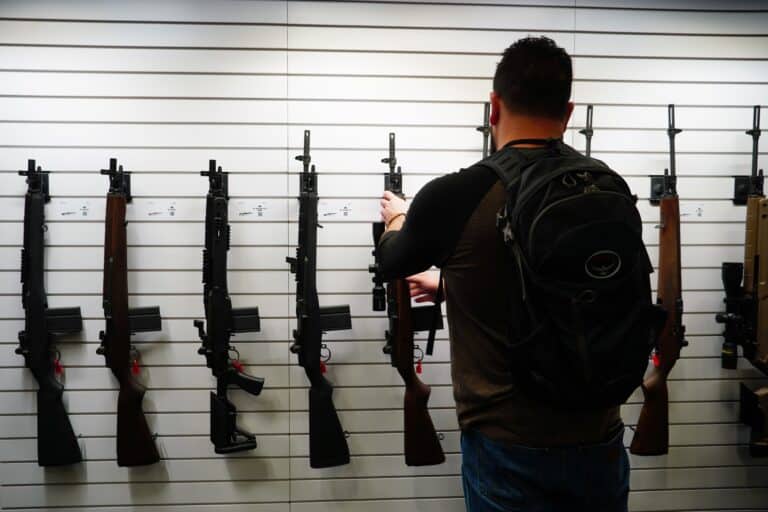The Republican Party stripped all of the gun-policy promises from its 2024 platform this week. Is that a sign that the party is turning away from gun voters?
In its first official platform in eight years, the GOP reduced its commitments to gun rights to just a single passing reference. In a preamble statement preceding any discussion of the party’s actual policy priorities, the document pledges that any Republican majority will defend “our fundamental freedoms, including freedom of speech, freedom of religion, and the right to keep and bear arms.” Further discussion of the Second Amendment, or any concrete gun policy ideas, appear nowhere else in the 16-page document published Monday.
Gun rights receiving just seven words in the GOP’s official platform came as a surprise to most onlookers, not only because guns have been such a critical Republican piety for many years but also because the party gave a much more full-throated embrace of them during its last presidential victory.
The GOP’s 2016 platform dedicated an entire section to the Second Amendment, explicitly listing pro-gun policies it supported and gun-control measures it opposed. That the Second Amendment received such short shrift comparatively in the new platform could signify that the party is softening its stance on the issue. However, it’s more likely that something else is going on.
Donald Trump, the party’s standard-bearer, has not shied away from cozying up to gun-rights proponents in his current campaign to retake the White House. He has already made multiple appearances at National Rifle Association (NRA) events, where he has directly courted gun voters by promising to undo all of President Biden’s gun control accomplishments and blocking any future legislative attempts.
While platforms are useful communication tools for informing voters where a party stands generally, they rarely mean much concretely in terms of political action. Policy outcomes under a given administration almost always hinge on the facts of the day rather than preordained platform planks. This is especially true in the age of Trump, where the GOP’s policy positions have increasingly been contingent on his whims–including gun policy.
The 2024 platform is no different in that sense. It reads more like a Donald Trump stump speech than a traditional party policy document, and multiple news outlets have reported that the former President personally authored and edited vast sections of the final product. So, while the lack of formal gun-rights promises in the adopted platform may appear like an institutional retreat from the issue, the changes are more cosmetic, and the practical impact on policy outcomes is effectively none for the time being.
What the removal of extensive pro-gun commitments does say, however, is that gun politics and their relative status in our current political culture is at a multi-year low point. At least, that’s how Trump and GOP leadership seem to perceive it.
The new platform was clearly crafted to attract (or at least not repel) moderates and swing voters in an attempt by the Trump campaign to help shore up their support in key swing states. It removed language endorsing a national abortion ban for the first time in 40 years, struck the party’s opposition to same-sex marriage, removed language on tackling the national debt, and pledged to leave intact Social Security and Medicare—all longtime GOP shibboleths the Trump campaign now appears to perceive as electoral weaknesses.
At the same time, the platform is by no means moderate throughout. On issues like immigration in particular, the new platform plants its flag much further right than recent GOP platforms, including in its pledge to “carry out the largest deportation program in American history” and to deploy both troops to the Southern border as well as the Navy to form a “Fentanyl blockade” around US waters.
That suggests Trump and the rest of the current GOP establishment view gun politics as a particular liability for them with swing voters and independents, akin to abortion restrictions and entitlement reform. That mirrors the thinking of President Biden and the Democratic Party in ways that should make gun-rights supporters uncomfortable.
The Biden campaign has already signaled to multiple national news outlets that it planned to use gun control as a winning issue for the President’s re-election bid among swing voters, particularly those in the suburbs. President Biden also spoke at Everytown’s national conference for the first time in his presidency earlier this year. Meanwhile, his campaign started running a gun-control ad in key swing states. His social media accounts have also been regularly posting support for new gun restrictions, including firearm and magazine bans.
Both parties now seem to agree, at least tacitly, that playing up gun rights is an electoral liability in ways that would have seemed alien to campaigns courting swing voters in past elections. If that holds, it’s an unsettling sign for the political prospects of gun owners. And it’s not the only one.
The gun-rights movement’s most politically influential interest group was smacked down in court earlier this year in a high-profile corruption case that has severely diminished its stature and financial capabilities. None of the Republican candidates who challenged Trump in the primary sought to challenge his bump stock ban or comments supporting new gun restrictions or even attempted to bolster their own pro-gun credentials.
Now, the GOP is so gun-shy that it didn’t even pay lip service to the top policy priorities of the gun-rights movement.
It remains to be seen if the party’s reticence is a one-cycle blip or a longer-term trend. Concrete gun policy shifts from prominent GOP figures remain unlikely in the near term. However, it is safe to say that the party feels more comfortable taking gun voters for granted than they have in a long time and that alone is remarkable.







2 Responses
This could definitely hurt them. There are a whole lot more single-issue pro-gun voters out there than anti-gun voters. If the GOP backs away from openly advocating for gun rights, those voters probably won’t support the Democrats, but they might just stay home.
Yea, that’s the big risk. Will this keep gun voters at home?